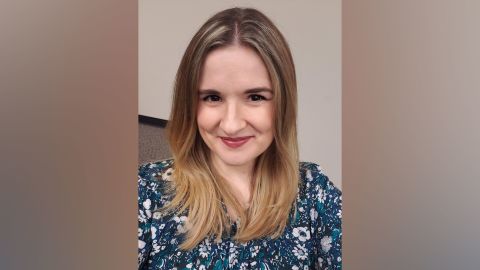Washington
CNN
—
President Joe Biden’s student loan forgiveness program remains blocked by federal courts for now. But for some borrowers, the recently extended federal pandemic pause on payments delivers an even bigger benefit.
For most federal student loan borrowers, balances have been frozen since March 2020. But those who are enrolled in the existing Public Service Loan Forgiveness program get an extra, lesser-known bonus from the pause that brings them closer to student debt cancellation without paying a dime.
For Josie Bicknell, a nurse practitioner at a nonprofit in Los Angeles, the pause could deliver roughly $38,000 in debt relief – much more than the $10,000 she would likely receive if Biden’s forgiveness program takes effect.
“I just keep my head down and pray for more extensions because that’s the best scenario for us,” Bicknell, 35, said.
The pause has been extended eight times, the latest of which was last month when Biden pushed back the restart date from January until after pending litigation over his student loan forgiveness program is resolved – or the end of August, whichever comes first. The administration’s goal is to be able to cancel some student debt before payments restart.
The Supreme Court has agreed to hear oral arguments in a case in February, with a decision expected by June.
The Public Service Loan Forgiveness program cancels all outstanding student debt – regardless of how much there is – for qualifying public sector workers after they make 120 monthly payments on their loans, which would take at least 10 years.
During the pause, these borrowers aren’t required to make payments just like everyone else – yet they still receive credit toward the Public Service Loan Forgiveness program as though they did make the payments, as long as all other qualifications are met.
Put another way, PSLF borrowers have received credit for nearly 33 months so far without making any payments.
Bicknell estimates she would have been paying at least $1,150 a month since March 2020 if the pause was not in place – which would have totaled nearly $38,000.
Instead, Bicknell has used that money to pay for child care and to save for a future home. She and her husband also moved their children to a more family-friendly community where the rent is higher.
By the time the pandemic hit, Bicknell had made about six years of payments on her student debt, paying off nearly $110,000. Despite those payments, her balance is nearly just as much as what she originally borrowed due to interest. She expects to be eligible for debt cancellation from the Public Service Loan Forgiveness program in January 2024 – when the remaining debt, worth more than $100,000, will be wiped away.
There are roughly 1.6 million people pursuing the Public Service Loan Forgiveness program, according to a government estimate from October.
Borrowers must be employed full time by a qualifying nonprofit or the government while making payments in order to benefit from the program.
Many teachers, social workers and first responders, as well as some doctors and lawyers, may qualify, for example.
Borrowers must also be enrolled in a federal income-driven repayment plan, which ties monthly payments to a borrower’s income and family size. Generally, the more net income a borrower has, the bigger the monthly loan payment.

Lauren McClain, who teaches political science and government at a community college in Texas, has been working in the public sector and making payments on her student loans since 2014. She has about $151,000 of student debt remaining and expects to be granted forgiveness under the PSLF program in 2024.
She estimates she’s saved nearly $20,000 thanks to the pause, while Biden’s forgiveness program wouldn’t have actually helped her financially.
“$10,000 in forgiveness wouldn’t make a difference for me because it doesn’t make my payments lower,” McClain said.
“Whenever there’s even a rumor of the pause being extended, I get really excited. It’s made such a huge difference for us,” she added.